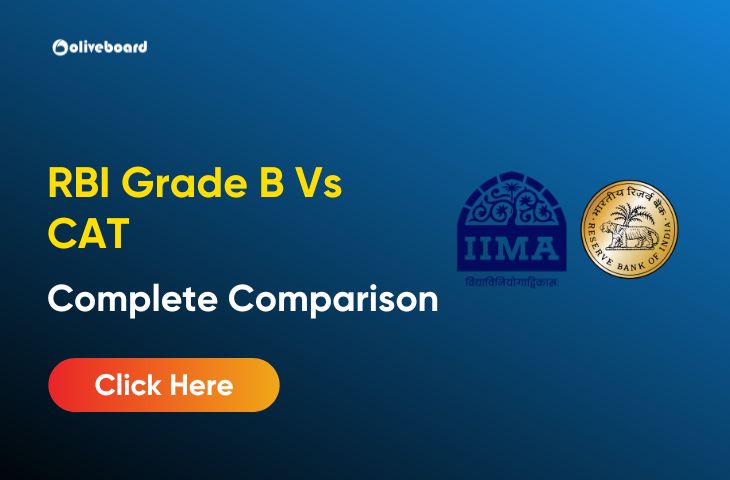RBI Grade B Vs CAT
For aspirants aiming to embark on a career in finance, economics, or management, the choice i.e. RBI Grade B Vs CAT (Common Admission Test) is crucial. Both pathways offer promising careers, but they are different in terms of focus, opportunities, and skill sets required. Let’s see RBI Grade B Vs CAT comparison below, catering to the needs of both government job aspirants and CAT aspirants.
RBI Grade B Vs CAT Which is Tough
In the table below, you will find the complete comparison of RBI Grade B Vs CAT on the basis of various parameters, so check them out:
| Parameters | RBI Grade B | CAT |
| Eligibility Criteria | Bachelor’s degree with a minimum of 60% marks. Age limit usually between 21 to 30 years. | Bachelor’s degree with a minimum of 50% marks. No age limit. |
| Selection Process | Phase-I: Preliminary Exam Phase-II: Main Exam Phase-III: Interview | CAT Exam, Group Discussion and Personal Interview |
| Exam Format | Objective MCQs for Reasoning, Quants, English & GA in Prelims. 50 % Objective MCQs & 50% Descriptive for ESI & FM in Mains and Descriptive English. Download RBI Grade B PYQ PDF | MCQs and Descriptive Questions on Verbal Ability and Reading Comprehension, Data Interpretation and Logical Reasoning & Quantitative Ability. |
| Career Prospects | Offers a prestigious career in central banking, economic policy-making, and financial regulation. Diverse roles in RBI including research, policy, banking supervision, and currency management. | Opens doors to top management institutes like IIMs and other prestigious B-schools. Leadership positions in corporate sectors, consulting, finance, and entrepreneurship. |
| Work-Life Balance | Generally stable working hours with occasional demands during monetary policy cycles. | Varies based on career choices and organizational culture. |
| Job Security | High job security and attractive benefits. | Job security varies across sectors, but top B-school graduates often command lucrative offers. |
| Preparation | Requires focused preparation on economics & social issues, finance, management concepts along with current affairs and general awareness. | Rigorous preparation needed on quantitative aptitude, verbal reasoning, and data interpretation. |
| Competition Level | Highly competitive due to limited vacancies and the prestigious nature of the job. | Intense competition due to limited seats and high demand for top B-schools. |
| Cost of Preparation | Moderate, depending on coaching, study materials, and mock tests. | High, including coaching fees, study materials, and exam fees. |
| Stress Levels | Moderate stress due to the depth of syllabus and the importance of the role. | High stress during preparation due to the competitive nature of the exam. |
Is RBI Grade B and CAT Syllabus Same
The RBI Grade B and CAT syllabi are not the same, although they share some common topics. The RBI Grade B syllabus focuses on subjects like Economics, Finance, Management, and General Awareness, tailored to the needs of a central banking role. In contrast, the CAT (Common Admission Test) syllabus emphasizes Quantitative Aptitude, Verbal Ability, Data Interpretation, and Logical Reasoning, aimed at assessing candidates for management studies. Understanding these differences is crucial for aspirants to prepare effectively for each exam, aligning their study strategies with the specific requirements and focus areas of the respective syllabi.
Factors to be considered while choosing between RBI Grade B Vs CAT
To determine which position is better for you, consider the following factors:
- Personal Interests: Your interests and passions should align with the responsibilities of the position. Choose the one that aligns with your career goals and aspirations.
- Skills and Qualifications: Evaluate whether you possess the required skills and qualifications for each position. Different roles may require different educational backgrounds and skill sets.
- Understanding your career goals: Take a look on your long-term career aspirations. Are you inclined towards a career in central banking, economic policy-making, and financial regulation? Or do you see yourself pursuing management roles in corporate sectors, consulting, or entrepreneurship? Understanding your career goals will provide a clear direction in choosing between RBI Grade B and CAT.
- Work-Life Balance: Consider the work culture and work-life balance associated with each organization and role. Some positions may have demanding work hours and responsibilities.
- Career Progression: Research the potential for career growth and advancement in each organization. Some positions may offer faster career progression than others.
- Location Preferences: Think about your location preferences, as these organizations may have different posting locations.
- Compensation and Benefits: Compare the compensation packages and benefits offered by each organization.
Join Our Whatsapp community Now
- CCI Last Minute Revision Plan for 8th July 2025, Check Tips
- Effective Study Strategies for the PFRDA Grade A Statistics
- PFRDA Grade A Lifestyle in 2025, Their Growth and Benefits
- PFRDA Grade A Exam Date 2025, Check Complete Exam Schedule
- PFRDA Grade A Salary 2025, Check In Hand Salary
- PFRDA Grade A Syllabus & Exam Pattern 2025, Detailed

Hello there! I’m a dedicated Government Job aspirant turned passionate writer & content marketer. My blogs are a one-stop destination for accurate and comprehensive information on exams like Regulatory Bodies, Banking, SSC, State PSCs, and more. I’m on a mission to provide you with all the details you need, conveniently in one place. When I’m not writing and marketing, you’ll find me happily experimenting in the kitchen, cooking up delightful treats. Join me on this journey of knowledge and flavors!
